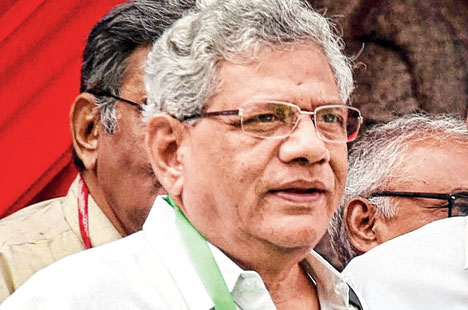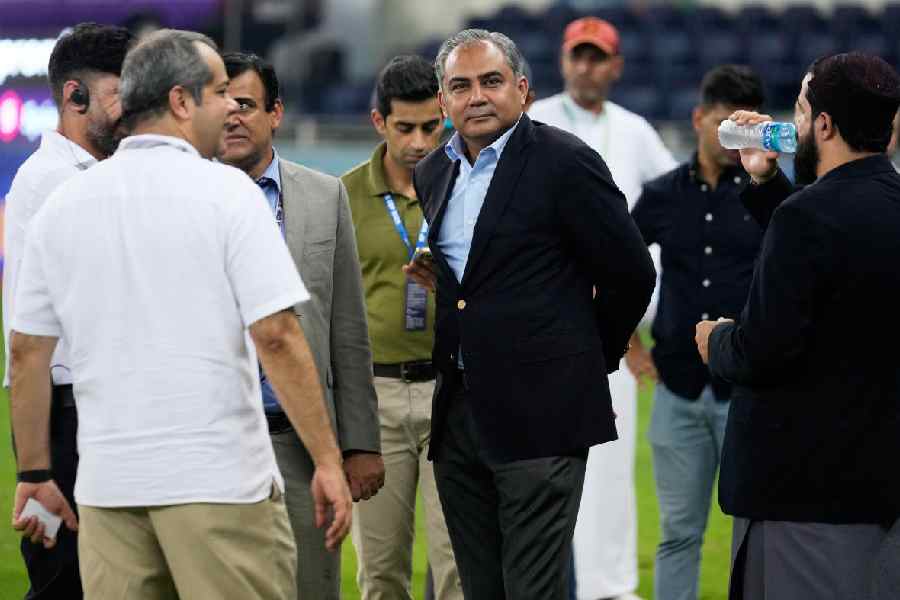
Hyderabad: Sitaram Yechury on Sunday returned as the CPM's general secretary with his hand slightly strengthened in the politburo and the central committee, which continue to weigh in favour of the hardliners who had tried to derail his second chance by propping up former Tripura chief minister Manik Sarkar.
Sarkar's name was proposed by politburo member S. Ramachandran Pillai ("SRP") but the former chief minister backed out when Yechury said it would be a bad move politically to shift him from Tripura at a time when the rank and file there needed him the most.
What further tilted the scales in Yechury's favour was his refusal to reveal his cards in the event Sarkar's name was suggested to the newly elected central committee.
Yechury's election was not unanimous, with three central committee members said to have abstained from voting after they and another member spoke against his return as general secretary. They were from among the 11 who had opposed the change in the political line when the outgoing politburo on Friday decided to factor in Yechury's pragmatic approach on working with other parties, particularly the Congress.
Apprehensive that the effort to oust Yechury may not work just two days after his political line won overwhelming support from the delegates at the 22nd party congress, the hardliners decided to back off. But by all indications, the divisions within the party are too deep to be papered over.
This probably explains Yechury's stress on unity in his closing speech after his re-election.
"We've had a very momentous congress... important decisions were taken. If there is any single message that should go out from this 22nd congress... to the entire party, our rank and file and the country, it is that the CPM has emerged from this congress as a united party that is determined to carry out our revolutionary task of putting forward before the people of India the alternative policy framework against the ruling classes' policies...."
Earlier, the party congress had unanimously elected a central committee after a feeble contest by a delegate from Himachal Pradesh and another from Tamil Nadu. Both of them withdrew, the former following some persuasion.
The newly constituted 95-member central committee has 19 new members, three of whom were permanent invitees to the outgoing body. Nearly half of the 19 are said to be from the Yechury camp. He has increased his support in the central committee with the rejig, but the dice is still loaded in favour of the hardliners.
In the politburo, Yechury had to yield to pressure from former general secretary Prakash Karat to retain "SRP", who had turned 80 in February and expressed a desire to step down.
The new faces in the politburo are Tapan Sen and Nilotpal Basu. Sen came in as Citu's representative and trumped its president, K. Hemalata.
Yechury failed to have G. Ramakrishnan dropped from the politburo or bring in Ashok Dhawale, president of the All India Kisan Sabha, which had organised the much-celebrated Kisan Long March.
One of the reasons Dhawale's entry into the politburo was blocked, apparently, was the possibility that the available politburo in Delhi would then be evenly balanced between the Karat and Yechury lobbies.
As with the central committee, Yechury's position in the politburo has been strengthened a little with the departure of A.K. Padmanabhan. But the hardliners' dominance persists, causin many delegates to wonder whether the party's central leadership would be able to function with any cohesion.
Despite Yechury advocating the "Lal Salaam Jai Bhim" slogan, the party has again failed to accommodate a Dalit in the politburo although the socially disadvantaged community has found more representation in the central committee.
On Saturday, asked by the media, senior party member Brinda Karat had indicated the possibility of a Dalit making it to the politburo for the first time in the 54 years since the CPM was formed.
"We are aware of the social composition of various committees in the party, and we will not disappoint you," she had said.










